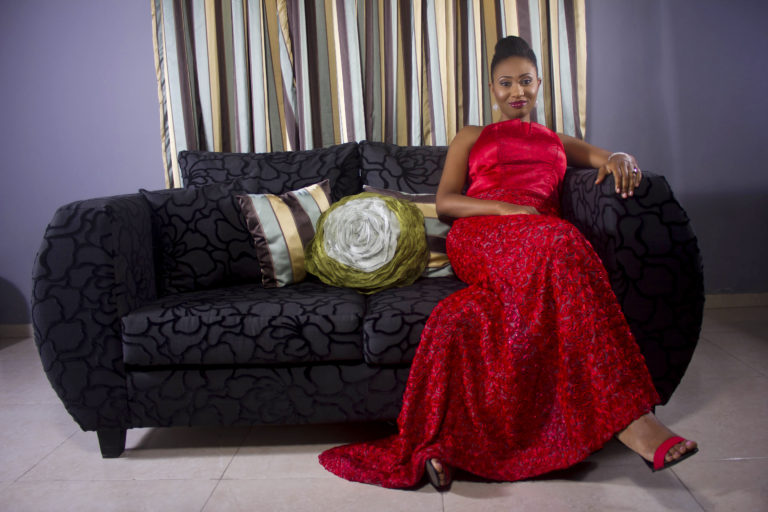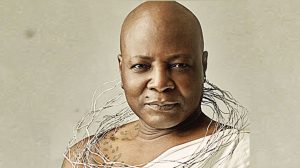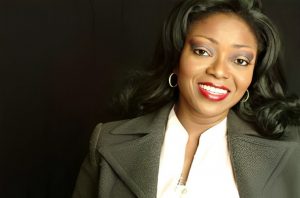The beautiful tones and tunes of Ranti Ihimoyan

At the beginning of the COVID-19 pandemic, while the world was locked down, there was one busy bee, buzzing all through the airwaves of Lagos. If she wasn’t at one Isolation Centre soothing the gasping hearts of the infirmed, she was at a Falomo roundabout pitching peace to a frazzled populace, who not knowing the nature of the disease the world was locking up for, was pretty frightened by the near-wartime street silence. Not Ranti Ihimoyan. A prima donna never stops the singing, no matter the danger. For Ranti, the world is her oyster. Ranti is an opera and crossover recording artiste versatile in folk, jazz and pop music. She won ’Best Alternative Music Video’ at the 2016 Nigeria Music Video Awards for her debut folk recording ‘Iwe Kiko’. Her passion for singing started in high school in Nigeria where she won first place in the Shell Schools’ Competition and sang in the 2001 Musical Society of Nigeria (MUSON) Festival. During the COVID-19 lockdown Ranti had a down-to-earth conversation with LM’s Publisher/Editor, Nkanu Egbe where she spoke candidly about her music – past, present, future…
How did you start singing?
I started singing through a neighbour of mine, who was a music teacher. He coached me as a child. From my primary school days, he started teaching me songs, teaching me the theory of music and that was how I started. Then from there, mostly in secondary school and university, I just sang all the time. I took music lessons up to JSS3 and then I just started studying music on my own and taking Music Society of Nigeria and Board of Royal School of Music examinations on my own.
So, what grade did you get up to?
I got to Grade 5 in theory and Grade 8 in singing.
Fantastic. At least you covered all the bases.
Yes, I did.

You do sing opera, yes?
Yes, I do. I started from secondary school. My school principal had organised an opera and I wasn’t in it but I had auditioned for it. I felt it was because the other students were so much older than I was being just a junior school student. So, I begged my teacher to take me off. And then, finally, in senior secondary, I was in another production, Night in Bethlehem by Laz Ekweme. Since then, I have just loved the idea of singing and acting on stage. I studied Engineering but…
That’s the amazing thing. Most of you, opera singers, come from the sciences.
Yea, yea. Maybe you need a scientific brain to do that, I’m not sure. (Laughs). It can be complicated sometimes, especially when you’re singing in a different language from yours and you have to memorize the texts and act out all those texts.
So, after MUSON, did you go outside to study any more music, like in any of the conservatories?
Yes. What I did was, I was actually studying for a minor and I was at the Illinois Institute of Technology in the US and there was an affiliate school called Vandercook College of Music. From there, I took piano, voice and flute lessons and I was also in a choir and I took some other minor courses like World Music. I did not get a minor degree in music because I wanted a scholarship so badly in engineering and I thought that if they saw that I was doing a minor, they might deny me. So, I chickened out. I thought if I had applied formally for a minor, I would forfeit the engineering scholarship that I was desperate for. So, what I just did was I just took those classes on my own time. I got credits for them, but I didn’t pursue a degree in them.

So, you forfeited your music degree?
Yes. I gave up the minor degree in music because I was afraid that I would not get my engineering scholarship. Anyway, that was my rationale as a young girl. It probably didn’t matter. It probably wouldn’t have mattered at that point. But at least, I got the knowledge as I was taking up classes and so that helped.
What field of engineering did you study?
Chemical Engineering.
Chemical? Wow! Jo Oparamanuike is also a Chemical Engineer.
Yes. Exactly. There was even another guy, but he didn’t finish.
How do you guys relate?
We’re good friends and we have a lot in common.
I’m not surprised. So, there is a correlation between science and music.
Yes. I think there might just be. I think classical music can be very mathematical as well. So, you have a situation to do well in mathematics, and do well in music.
Okay. Then, it helps you on both sides, kind of. And of course, it helps the brain, the left and right.
Yes. It does.
At what point did you say, “I’ve finished my engineering and I’m going back to Nigeria”?
I worked for a while and was lucky to have started really young. I mean I turned 16 in my first week in the university. I felt I had all the time to try at least one career first and then decide when to change careers after I have had more knowledge. I worked in refining and the oil and gas for a number of years but I always made sure that I was always singing, even if it’s in the choir. Wherever I found myself, I just sing. And then I met my husband in school, we got married after graduation. Everything went really fast.
Were you in your early 20s then?
Yes. I was in my early 20s. So, he wanted to move back home because he was very excited about the margin market and the opportunities. I mean I was missing Nigeria as much as he was, but I actually wanted to move to Europe to study singing properly. That was what I had decided to do. So, coming back to Nigeria felt like punishment to me as that was not my plan but I came back in good faith because I was like it’s home anyway, so it’s fine, let’s go home. As soon as I got back to Nigeria, the Music Society of Nigeria (MUSON) started doing a fully staged opera production. Before then, they were just doing short scenes and all, but that year, they staged a full opera production and that was the year I moved back to Nigeria and I have been in most of them. For me, that was a confirmation that I came to back here at the right time. Even then, I still kept working as an Engineer, but then I felt I needed to take this thing seriously. I was really starting to fall in love with my job as an Engineer because I was now more of a regulatory engineer and I was really enjoying my job and forgetting about singing. Then, I felt it was time to make a decision, otherwise, I will just accidentally find myself in a different path than what I needed to be doing. I decided to leave Engineering and go abroad for some short courses. The rest is history….
As they say. Yes. So, did you go to Italy? I know there are lots of conservatories there.
Yes. So, I did these summer programmes. They are performance intensive, not theory or classroom. This was practically immersing oneself in the language. I was in Italy, and Austria, and then, the United States – those three countries. In the United States, we didn’t immerse much in the language there, as much as we were immersing ourselves in the roles, but in Italy and Austria, we did intensive Italian courses and German courses. And then, of course, we practiced singing, acting techniques, and all kinds of amazing learning experiences. I got to work with top professors and professionals in their various fields. I felt I got a lot from the programme because I was in touch with some of the best professors in the world versus going to a university and you’re assigned someone you don’t really know much about. So, this was great as you got exposed to meeting casting directors, who would tell you what to expect in the real world and share contacts with you. Yea, they were really good and then I still wanted to come back to Nigeria because I found out that in some universities in the United States, you might go through school for four years and only perform once or twice. I mean you would really audition before you get a role. So, I felt like the Opera programme I was doing was actually more beneficial for my stage in life being a returnee or being an adult student.

So, in Italy, did you get involved in the productions?
Yes, I did. I got involved a production brought by an American professor. I can’t quite remember the name now. Anyway, she brought the best of the best of the best. But William Matteuzzi is one of the best tenor voices in Italy. He got to give us master classes. I got to play three roles just in a matter of six weeks. It was a very intense programme and then we got immersed. We were in the village so we had to speak Italian. Some of the villagers I spoke to are still my friends till today. They can’t speak a word of English, so we chat in Italian. I use the dictionary sometimes. So, it was just a really good immersive experience.
So how many times have you done these summer courses?
Five. Oh wow, that’s a lot. (Laughs).
So, do you still plan to go back? Is this something you did to try to get a qualification for?
I never really was into qualifications. I don’t know, sometimes I wonder maybe I should have.
But it doesn’t matter now…
Ah yes. My priority was to perform with some of the best performers in the world. I wanted to perform, I needed to be critiqued and I learned a lot in a short period of time. Of course, I still have a lot of growing to do. I’m at a point where I want to audition for international agents as that has been my priority since last year. I’ve met some connections, I’ve done a few and I still need to do a whole lot more. Of course, in Nigeria, I’m doing classical music, I’m doing contemporary music, I’m doing everything that I want to do. It’s really good.
Okay. Let me take you back a bit. Has any international agent tapped you up?
Yes. There’s just been one major conversation, let’s say one and a half, but we haven’t sealed the deal yet. I think I will need to go…the next step is just to go there physically to establish the connection. From the feedback I’ve gotten, it shows that I have improved based on that feedback. Then the natural growth of my voice. Two years ago, my voice changed again.

Your voice changed?
Yes. It’s very subtle to any person. It’s not a remarkable change.
But it changes for the better, right?
Yes, it does. It’s more rounded, more mature. So, I’m able to do more music now, I’m able to do some different repertoire that I wasn’t doing before. There was some repertoire that I was doing that made me not sound as light as before and not sound quite right anymore.
That’s nice. So, are you like Kiri Te Kanawa now?
Well, yea. Um, I think I sound more like, mmm, who can I compare myself to? That’s a good question. I will say Renata Scotto from Italy, she is about 70 or 80 years now. She has this beautiful rich voice, and she sang a lot of Pavarotti, Puccini and Verdi music.
That’s lovely. So, if I can guess your age correctly, you are between 30 and 40, right?
Yes, I’m in my early 30s.
Okay, so that means you’re maturing and getting to the stage where you become really solid.
Yes, exactly! So, like now, the voice I have will be the voice I have forever. So, I’m settling into my instruments.
That’s good. You mentioned contemporary music in Nigeria earlier…
Yes.
Why contemporary music? Is it because you want mass appeal?
The reason I chose contemporary music here is because I have been singing contemporary music from Day One. It’s just that in Nigeria, nobody around you sings opera. You’re singing what everyone else is singing. You, know, when I first came to Nigeria, what happened to me was I had a lot of naysayers about neoclassical music that I was in the wrong place and I believed them. So, I said maybe I need to restructure my dream, so I started a band and did a few gigs. I was doing really well as I was doing corporate gigs, parties, I almost became a soul singer.
Wow! Well, the good thing about it is you can sing the low tones, not just the high tones. You can sing low to high tones.
Yes, exactly!
So, you’re a natural soprano who can sing tenor.
Yes, the high tenor. So, I can sing metal soprano, Alto repertoire and dramatic soprano repertoire. So, I’m trying to keep it in that range even as my voice grows.
Okay. That’s the beauty of music, the fact that there are so many levels and you can peel and continue to peel and continue to peel.
Exactly. Yes, that’s the beauty. It’s like an endless onion, it is limitless.
Yes. So, you have done a few albums in Nigeria…
Singles. I have released some singles.
Okay, how many singles have you released?
Five.
Okay. When are you going to release an album? What genre is it going to be? Will it be contemporary or classical?
You have hit the nail on the head. This is a question I have not been able to answer and I gave up answering them a year or two ago. So, I said to myself that I need to stop overthinking things because as an analytical or Chemical Engineer, I tend to overthink sometimes, but I don’t have to. I probably will release both albums. I almost started an album recording with piano and percussion last year, but I decided not to proceed and get some other work done. Let me explain what happened last year. Last year, I decided to do only classical but as I was trying to record and fine-tune and get an album together, it still felt like I hadn’t gotten it right. Then, I met someone who showed me another way of classical and contemporary singing and I actually felt at home and at peace. That was the basis upon which I recorded my latest single called, There is a Fire. It was in the course that I was comfortable with the cross over style that sat well and I could stomach, so to speak. I actually enjoyed the process of doing it.
I know every artiste has a mentor till they go to the grave. So, who is mentoring you right now
I have a lot of mentors from afar right now, so to speak. I don’t really have some people who are kind, advise me, and hear one’s opinion on some certain issues. Sometimes, they change as I tend to, inadvertently, drift apart between mentors. But over the years, there are some people that I have considered mentors at different phases of my career, maybe names like Yinka Davies, Sir Victor Uwaifo, at some point I met Bongos Ikwue…
Wow! Where did you meet Bongos?
I met him in Port Harcourt when I was doing my band music, we did contemporary with classical in a way. I mean we got around quite well.
Okay, and how did your husband react to all these?
He has been okay with it. He was quite receptive to it. Even though, he has been wondering how one could work with classical music. Again, for him, classical music is vague and he is like, “why are you doing this?” But he could then see the potential and effort. We had actually hit the ground running and we made a lot of money those years. The thing about me is once I have a strong feeling in my heart about something, it just doesn’t leave me.
That’s good. So, you’ve been on lockdown and this has been an opportunity for individual artistes to excel and a lot of you are on different platforms interacting with each other and making whole the world beautiful, what has been your experience during this lockdown?
So, at the beginning of the whole crisis, when it started becoming apparent that we were in a pandemic, I felt like my life was on standstill in that moment and everything was just…still. But as human beings, we are dynamic, and we adapt easily and shake things off and keep going. So, after a few weeks into the pandemic, it became clear to me that there is an opportunity in the sky to refocus, retrain and reprioritise and come up with fresh ideas. Fortunately for me, while I was sitting in my house, I got a phone call and they said that I should perform Amazing Grace in a style that Andre Bocelli had just concluded in a concert a week before. So, Arise News Television said they want to have something like that for our own nation, our own country and we thought of you. I felt so honoured. So, what happened was, I sponsored the recording session and they sponsored the video. So, it was a good collaborative experience.
That’s interesting. So, you did the recording at home.
Yes. I actually did the recording in a studio.
How did that work?
Well, we just tried to be as cautious as possible, I had my mask on all through the recording. I mean it was a well contained routine. At the end of the day, I’m just happy that nothing went wrong.
Then, you did a live performance at Onikan, right?
Yes. That was a separate thing. A phone call came from Art for Life Initiative and that was organized by Madam Aduke Gomez who I had met earlier and spoke with from time to time. So, she invited me to sing at the Onikan isolation centre and I was blessed by the joy it brought. It was an awesome experience I will never forget.
How many children do you have?
I have two children.
The twins you just had two years ago, right?
Yes. Actually, it was 2017. They are toddlers now.
Before you had the twins, you didn’t have any children…
No. I was pursuing career.
That must have taken your time, because it took you 10 years?
Yes, that’s because I couldn’t figure out what to do in my career and I couldn’t figure out how to go about it yet, so I was not ready to have children. That would have complicated things for me at an early stage so I’m thankful that my desires worked out.
I hope that didn’t affect things at home.
No, it didn’t. The only thing is that our older generation, our parents were like, “what are you children doing? You’re being unreasonable, blah blah blah?” But I think they eventually understood this was how we wanted to lead our lives. I was terribly busy, and my husband was also busy, so how was that going to work in that phase of our lives? I mean, there was no room, to be honest. But things started getting clearer, especially for me and we began to see how we could have children and how they will be well cared for. Not just having children for having sake. You want to have them and nurture them and give them the right attention.
That’s true, and you had age on your side.
Exactly, yes! That’s what I kept telling everyone like, “See, relax, we married young, calm down.” I’m just thankful that everything worked out according to one’s desires. You know, because man proposes but you never know.
Yes. So, let me crystalize your thoughts. You want to take this thing higher. Do you think you can ply your trade successfully in a country like Nigeria where classical music hasn’t been fully accepted except by the few who studied classical music or did music education back in school, but for the general populace, it remains a strange phenomenon?
I think so. I didn’t think so a few years back from the social experiments I tried, so to speak. I mean all manner of people have heard me sing, like some unexpected people, and they say, “Oh, I love that, why can’t we hear more of this often?” I can’t start explaining to them that it’s funds, naysayers…I can’t. So, I just smile and say, “Don’t worry, you will hear more from me.” We can’t say that out of a population of how many million, we can’t find one million that will subscribe to this kind of music. No, I don’t agree.
Well, from my study of classical music from the Beethoveens and the Schuberts and the Bachs, they all do their own folk music syncopated in classical form, are you at home with our own folk music? Can you take our own folk music into the classical realm and make it acceptable worldwide? I mean, is that where I see you going?
Yes. That’s what I’m doing. So, I’m doing both and trying to get at least one million people to subscribe and support what I do because there is already a market that loves classical music outside the country and those are the people that exposed me to classical music. So, I’m going to try as much as possible to do both. I’m going to try to do Schubert and Bach like you mentioned and do old school folklore and do a remake of them in a classical manner or classical voice or arrangements. Some of the things I have heard, I remember leading up to the classical album I wanted to record. One of the reasons why I didn’t proceed was because I wasn’t enjoying what I was hearing. The kind of our music, I was just not getting the kind of inspiration that I was looking for and it wasn’t because of the music but because of the way the music has been handled. So, I had to start from scratch and it’s not easy, it’s not cheap. It’s a lot of work and it’s getting the right people to treat that music. I don’t claim to be an all-round musician. I am a singer, so my scope is pretty much defined.
You shouldn’t try to do everything, it could hurt. But here is what it is. You are an influencer in a sense that you have a direction of where you want to go, where you can express yourself. You have a wide audience like the conventional classical audience, in the United States, who want to hear their own kind of music. But here you want to bring a twist where you are giving them their music but introducing our own art form into their own kind of music so that they can get to understand that here is a peaceful Africa where there is rhythm and melody. So, you can have our rhythm and melody into their own harmony and create something wonderful. I remember I was listening to a classical music from the 80s by an American and while I was listening, there was an interlude and it was an African interlude, I listened carefully and heard a drumbeat that came from Calabar, the Ekpe music and it blended so well. I was like “oh my goodness”! It was a brilliant execution and since then I have always looked forward to a marriage between classical music and the African rhythm.
Yea. I want to correct what I said earlier. I have worked on some but I felt that I needed more. I have been recycling some of my songs, the way I do blend my repertoire with the western classical and our local music and it does come out quite nice. But I only have a handful and I wanted to create an album, a work full of things like that, so I am collecting them and I share the concept with some of my friends, my pianist friends and colleagues and they are able to work on it and make something out of it. I just did one at the isolation centre, but I think they need to be cooked. If it’s not done, it’s not done. I’m sorry, I can’t. I might perform it as an experiment, but I will not record it and put it down for posterity. No. But after I received the last call, I was awakened by my desire to go back to my collection and meet with my senior music colleagues to come to my rescue.
I don’t know if you have met Echezonachukwu Nduka.
No, I haven’t.
I will connect you two. He is a pianist and poet in the United States and what he does is he takes the African drumbeats and plays them on the piano.
Wow, that’s a great combination. I’m hopeful that by next year. I have a feeling that I will have more of those and I think they will be enough to put out a body of work and start putting out the classical. I think I have delayed putting on the “classical pieces”. They are classical pieces because they require a different approach and there is no standard of excellence. But the reason why I love contemporary music as well is because contemporary music is super broad. You can literarily just do something and name it and it will be loved. So that’s one of the advantages and why it’s easier for me to put out contemporary music for now but watch out, before the end of 2020/2021, a lot of those my mentors and musical power houses have taken it upon themselves to work on some ideas, so yes.
That’s great. One question, what is your plan for the lockdown, if this lockdown continues beyond June?
Well, my plan is to create. Like you said, making those connections, working with technology to try to create something. I mean luckily right now, in Lagos, there is some movement so I will try to work with one or two or three musicians and even on my own. I mean what I am doing now, is I am breaking down my rehearsals and “musical development process”. I have the European repertoire that I want to work on with my agent. I have the local content that I want to use to try to influence the development…and I have my contemporary music so my work is cut out for me, lockdown or not I am going to be locked in working and rehearsing. I mean, this is the best time ever to do that and spending more time with my family.
Okay, and you have young people you are looking after. Not your children, but those ones you are mentoring and teaching, do you have like a class for the young and upcoming?
I mean I don’t have anything formal, but I do have some people send questions all the time and all.
If you were to advise someone with breath control issues, what advice would you give?
Well, I think it’s really about optimizing the breath that you can take, and filling your back muscles as fast as possible, as if you’re filling your back muscles with air. So, it’s not about taking a deep breathe in like a balloon but getting your breath to the right place and efficiently utilising it in the back muscles. The air optimization is the same as when you swim or play the flute. It should be natural.
So, imagine you’re with Andre Bocelli, Kiri Te Kanawa and Renata Scotto in a room, how would you be able to combine all of those?
I think it would be heavenly, truly amazing. I would love to sing in their presence, it would be a true gift.
Thank you so much for the time.




